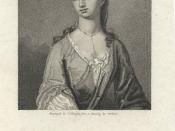This episode in Canto IV opens an insight into the unconscious mind of Belinda, following the loss of her "lock". The episode gives a clear yet somewhat complicated view of the state of Belinda's unconscious. Pope thus presents the issues, which were later put forward by Freud, concerning the role and importance of the unconscious. Therefore, using a Freudian theoretical framework, one can explore the role Pope may have intended for this episode, or indeed the role, which can now be interpreted.
Umbriel's journey to the "Cave of Spleen" echoes the translation of the "Anead", were Pope writes "But anxious cares", it is followed by Dryden with "...already seized the queen / she fed within her veins a flame unseen". This is the point where Dido is in love with Aeneas. This is thus perhaps a point of Belinda's growing affection for the Baron. This creates the complex that Belinda was feeling, preceding the eventual delve into the complexities of her own unconscious mind.
The "Cave of Spleen" is put forward as a place of malaise and melancholy, not only by its definition, but also in the onomatopoeia and melancholic tone in the words "Gnome...dome". Therefore, the mental state of Belinda is put forward quite literally as a physical place, personified with illness and depression. The "dreadful East" shows further imagery of depression. The "East" referred to by Pope could be referring to the same reference made in the previous Canto's, as the eastern world, a place of which is interesting and intriguing. Therefore, Pope is presenting the early eighteenth century "orientalism" as a dreadful terror. However, there is also a suggestion that he is referring more locally to the stench of humanity in East London blown towards the west from the trade areas. Pope also presents a socio-geographic point...


